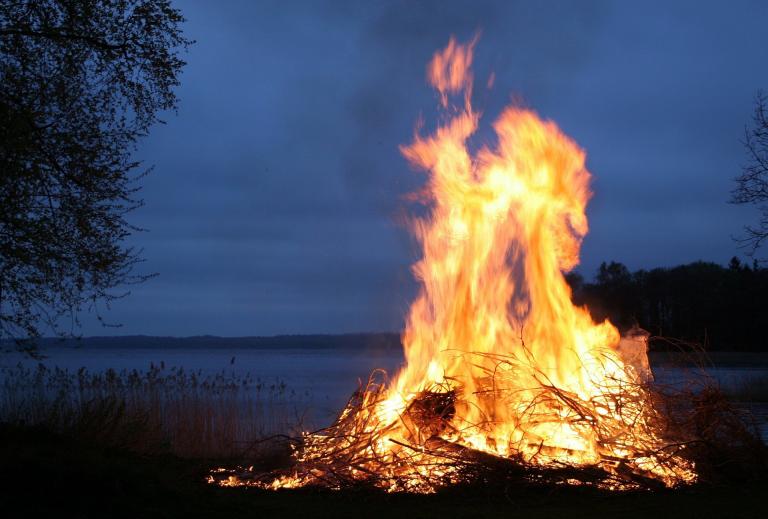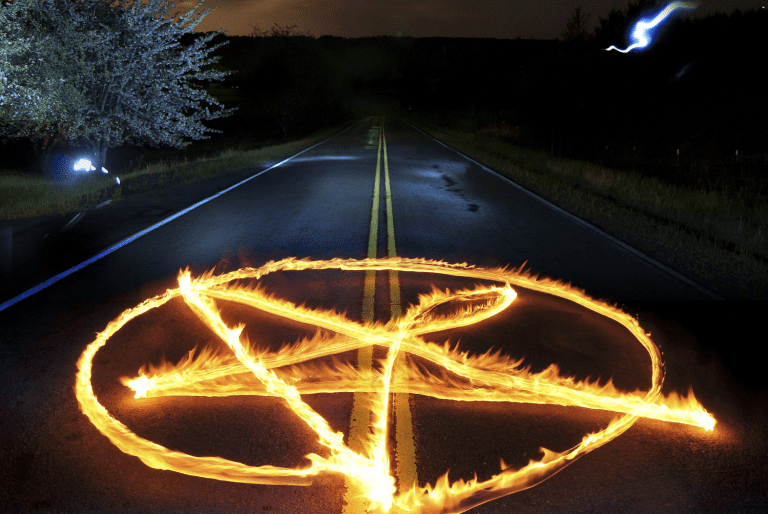(Originally published with the Irish Pagan Digest in July 2020, now released for my public readers).
In a world that feels a bit bizarre to most of us, with a pandemic of historic proportions locking down the world, there might not be a better time to look to paganism, or at least what I would consider core pagan practices. Our world has been turned on its head. There is less hustle and bustle, and more time spent together. I live in a rural area of Nova Scotia, Canada, and I personally have found that I am connected more deeply to the natural rhythms and cycles of the planet, and myself, because of the time spent here.
Despite the stress of things, paganism today has helped me connect and be present when the world (media, online/tv/etc) constantly tells us to live anywhere but the present moment. In this article I’ll share some of the core values and practices, verified by a “rigorous” survey (I asked people in groups, social circles, and friends).
I asked what pagans and witches felt was the one core value or practice that they maintained. Over 100 people respond, and their answers and my own have curated this list. Having reviewed all answers, I created themes based on these. Please note for this article I am using paganism and witchcraft interchangeably, though many pagans and witches do not identify as both.
Core Paganism/Witchcraft Values
Authentic Truth and Honesty
The most repeated value from all of them; truth and honesty were central values placed upon the path of paganism/witchcraft. In the context of a spiritual path, this pursuit of truth and of being truthful requires that one be discerning. Discernment of spiritual information you are receiving, be it through divination from another or oneself, the reading of omens, even your own instincts or intuition, is practical and valuable as you discover more of your spiritual beliefs and personal gnosis.
Telling the truth, or being honest, is also part of this value of discernment. Just as you are discerning the information you receive, others are also (hopefully) using the skill of discernment with you. As one respondent said, “Your truth and word is your bond.”
A Witch/Pagan who maintains authenticity with oneself and others will open up the world of spirit in a way that brings about deep connection and meaning to one’s spiritual practice.

Respect and Connection
One might initially think of the late great Aretha Franklin, when they hear the word respect. This was the second most common value that was shared, and the ways in which pagans and witches described in were varied. Respect as a theme for this article also encompasses integrity and authenticity, as core parts of self-respect. Respect also highlights the connection to one another and the natural world.
Defined as, “a feeling of deep admiration for someone or something elicited by their abilities, qualities, or achievements”, the theme of respect involves a desire and pursuit of unification through knowing how your practice impacts you. A wise friend of mine spoke of this as respect for your energy, for other practitioners, how your Power impacts others, and respect for yourself and your growth. Respect is not simply an attitude of “live and let live”, but one of serious admiration based on practice (others, and in particular, your own).
Harm None, But Take No Sh**
This is a value that springs from older maxims within modern witchcraft, and about 10% of those responding felt this was their core value. The maxim of “harm none” and it’s many variations seem to originate with Aleister Crowley (1904) – “Do what thou wilt shall be the whole of the Law”. The winding history is beautifully researched by Jason Mankey, and you can read about it here. Some of the more popular renditions include:
- Harm None.
- An it harm none, do as ye will.
- Eight words the witches creed fulfill, an it harm none, do as ye will.
This more modern witchcraft approach speaks to a balanced practice. There is a recognition of personal boundaries and standing firm in those. There is a power in the decision to not take on anything that could cause you or another harm, and the recognition that as a witch you can do something about it. Not only can you do something about it, but it is a moral imperative to do something when one sees harm. This shift came about in the late 90s and early 00s, and has really become central practice for many modern witches. There is a real shift towards personal boundaries, and a focus on justice with this modern variation on the older versions of the rede.
Personal Sovereignty
Further building on the updated version of the rede, sovereignty is about a unification of oneself with your “kingdom” to use the term in the textbook definition. What this means for you as an individual can vary. You could be a kingdom of one, connected to your land like the kings and queens of ancient Britain, married to the land or goddess. You could be placed in positions of leadership of a family, a coven, a tradition, in your workplace. Your personal sovereignty will have you rooted in your power, and connected not only to your energy, but to that of the world around you and will incorporate all of the above values to help you make decisions that sit with integrity and respect.
Reflection and Introspection
How might we gain respect and honesty in our spiritual practices? Deep reflection is required. In growth, or improving an ability, we need to review it, document it, and consider with seriousness the effect on our lives.
Though this is a practice to partner with the value of reflection, I highly recommend a journaling practice. As you explore different exercises, rituals, or the cycles of the year, writing about how they touch your life will show you the growth you experience in a concrete way. While this might be the final value I list, consider it the foundation that creates the space for other values that work well together.
Core Witchcraft/Paganism Practices
I found more variation among what witches and pagans described as core practices, which doesn’t come as a surprise for me. Given that Witches can practice any religion, the diversity I saw made me smile and celebrate the expansive ways in which Witches Craft. Nonetheless, I did try to build 5 themes based on the most frequent responses. Even within those, you’ll see there is a significant amount of overlap.
Attune to Nature and Cycles

When we practice paganism or witchcraft, we take a step off our linear calendar, and into the cyclical calendars of nature, the sun, the moon, and the stars. The majority of pagans I know will say that being in touch with the cycles of nature is a common practice for them, and important to their path. These cycles could look like observing the full moons, frequent study of astrological transits, measuring the season with fire festivals, solstices, and equinoxes. It is also a practice rooted in connecting where you are. For those new to a witchcraft practice, I would encourage you to get a moon phase calendar, or a farmers almanac for your area to start – those two tools will help you note the timing of seasonal changes, eclipses, moon phases, and you can note how you connect with them through meditation and journaling.
If you have an interest in Hekate, or ceremonial magick, I wrote about how I incorporate the Four Adorations into a practice on the sabbats.
Psychic Listening
This practice is without a doubt, a major daily practice for me. I believe that all people have psychic ability, and with exercise of the ability, it can grow just as any other skill, or a muscle group might through exercise. Psychic listening occurs in a number of ways, that are all linked to the 5 physical senses. Clear seeing, clear hearing, clear smelling, clear tasting, and clear feeling are all ways through which we can experience psychic phenomena. If you are practicing in such a way that you celebrate ritual, do spellcraft, divination, energy healing, or other common aspects of the craft, stretching your psychic muscles will provide a comprehensive experience of each of these practices.
If you are not yet familiar with how to work your psychic muscles, I highly recommend reading Psychic Witch by Mat Auryn. This book just came out in 2020, and has shifted how I do my daily practice to be more focused on incorporating my psychic senses.
Ancestral Wisdom and Practice
One of the reasons I feel we have seen a larger trend towards paganism, is a desire to connect to something older than current popular religions. There is a seeking of our ancestors, of blood and ancestors of choice (professions, of witchcraft, of sexuality). This trend of seeking our ancestors and history about them isn’t limited to a pagan practice and we see millions around the globe obtaining their DNA ancestry results to feel connected to a lineage.
As witches and pagans, connecting to the ancestral wisdom and practices can mean having a simple place where we work with our recent ancestors, or recently dead. It can also involve meditations, vision work, and divination to learn from our ancestors. Personally I like to work with my ancestors both at an ancestor altar, and while farming. I come from a long line of farmers, and often get wisdom coming through while weeding a garden row, or cleaning out a barn stall. When we ask to work with our ancestors, they are the spirits most eager to do so – they want to see their descendants doing well!
Regular Meditation
Setting a regular meditation practice is encouraged for a healthy mind, body, and spirit. It helps us relax, lowering our cortisol levels and decreasing our blood pressure, reducing migraines, and can help prevent disease. (Source)
In addition to the fantastic physical effects of mindfulness, it is a core practice for anyone who wants to get to know themselves completely. The expression of “know thyself” was the one core practice of almost 20% of respondents. Seeking out who we are is the work of becoming a well rounded person, and a responsible practice for anyone who feels the pull of becoming a priestess or priest in their tradition. This is an important practice in self-reflection.
To begin a regular meditation practice, start with simple mindfulness practices where you observe your body, and what is around you. Begin with this for a few minutes each day, and then as you get more comfortable, work with guided meditations, or extending the time of your meditations. If a daily short practice is not possible, schedule it in as frequently as you can. I know I personally look forward to my meditation time.

Spirit Work
Wow. For the final theme I really chose a broad title. I had so many respondents note the importance of themes such as mediumship, being in tune, seeking spiritual truths, seeking divinity, and connection to the spirit world. Spirit work is quite broad, and includes working with any spiritual entity to connect to that which is beyond the physical. Doing this builds our psychic muscles, and for many witches is a core practice.
One person in particular noted that we do this, “becoming storytellers of our time and creating modern myth through spirit work” and I just love how this is stated. All of the work that pagans and witches can do with the spiritual world, create experiences that vibrate in frequency with our own energy, and have the potential to ripple out from us to others. Just as those who created the stories of Taliesin, we are having spiritual experiences that will leave echoes in the stories told by future generations.
The secret: there isn’t one core value or practice.
What I hope this article conveys and inspires, is that all of these practices are possible within your path. All of these practices and values come from witches and pagans who practice very different paths. I asked them a very difficult question, to share only 1 practice. This header statement was given by one of the respondents, and they are right. There isn’t one value, practice, or way of being a Witch/Pagan that can sum up what paganism is today. My sincere wish is that by providing these themes, you are able to then reflect on what your practice currently looks like, and where you want it to go throughout your life.
Want to read more? I wrote about the decades most important advances within the craft: https://www.patheos.com/blogs/livingtheliminal/2020/11/10-years-of-important-advances-in-witchcraft/
In Love, Will, and Wisdom,
Jade.
Subscribe to my blog here, and follow me with more at www.livingtheliminal.ca















